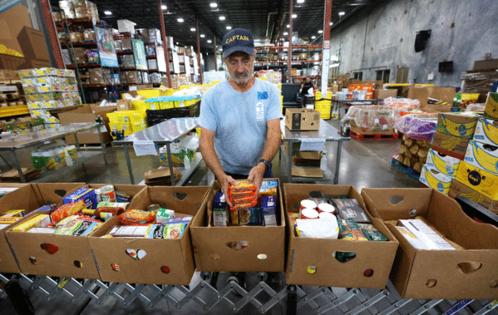Food bank in Florida in 'crisis mode' after federal cuts cancel food deliveries
Published in News & Features
ORLANDO, Fla. — Twenty-eight flatbed trucks filled with produce and other fresh food were scheduled to arrive this week at the Second Harvest Food Bank of Central Florida, but the Trump administration canceled the deliveries.
The news has put the regional food bank in “crisis mode” as it reels from the loss of $1.6 million worth of food, said Greg Higgerson, the agency’s chief development officer.
“This means lots and lots of families aren’t going to have as much food available,” Higgerson said.
Second Harvest serves as a regional supplier for food banks across Central Florida and now all of them will have less to offer thousands of residents who need help, he said.
The now canceled shipments of fruits, vegetables, chicken, pork and milk were part of a U.S. Department of Agriculture program that purchased food from American farmers and distributed it to food banks around the country.
Second Harvest started receiving food from that program during the COVID-19 pandemic, and it was providing about 10% of the agency’s overall food supply, including a large portion of its fresh items.
Higgerson, who learned of the canceled shipments Tuesday, said he does not yet know if the decision is temporary or if the cuts are permanent. If the program is not reinstated, Higgerson said 5.8 million meals a year will be lost.
Food banks nationwide have reported similar fears.
The agriculture department said in statements to the media that the program that sent food from farms to food banks was meant to be a short-term one.
The Biden administration funneled “billions” into it with “no plan for longevity,” the department said in a statement released earlier this month to Minnesota TV station KSTP.
“The COVID era is over—USDA’s approach to nutrition programs will reflect that reality moving forward,” the statement said.
The deliveries expected this week in Orlando would have provided about 900,000 meals, Second Harvest said.
The agency relies on community partners to distribute its food, so the cancelled deliveries will impact the Salvation Army, the Coalition for the Homeless of Central Florida, church-run pantries and hundreds of other charities that help get food to residents struggling with grocery bills.
Higgerson and others said though the pandemic is over, financial hardships that started in 2020 remain and the demand for help is still high.
“As prices have gone up it’s less a function of a pandemic than it is what people are having to pay for things like groceries and rent and daycare. Low-income people especially are suffering right now,” Higgerson said.
Stephanie Bowman is the founder of One Heart for Women and Children, a community food pantry in College Park that relies on Second Harvest for more than half of its food supply.
Prior to the pandemic, Bowman said her pantry distributed food to 3,000 people each month. When the pandemic hit, that number jumped to 27,000 people a month. Today, she serves 15,000 people each month.
“The numbers will probably never go back down, unfortunately,” Bowman said.
Bowman started One Heart after she and her children experienced a bout of homelessness.
“We were eating out of dumpsters, and we were depending on what other people gave us, and it was not fresh healthy foods,” Bowman said.
When Bowman founded One Heart her aim was to distribute fresh food to those who visited her charity. But without the federal program, Bowman worries her pantry will be filled mostly with canned goods and packaged foods.
She is hoping community support, including residents with chickens who donate eggs, will help fill some of the gaps.
“We’re here to help the community the best that we can, and we’re getting super creative. Just like the beginning of the COVID pandemic, we had to get super creative, and that’s what we’re doing right now,” she added.
-------------
©2025 Orlando Sentinel. Visit at orlandosentinel.com. Distributed by Tribune Content Agency, LLC.







Comments